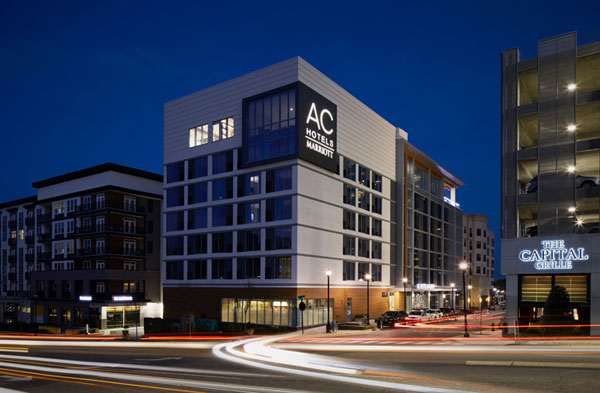✕

Column: industry Tag: Customization,Concord Hospitality,hotel development,branded hotels Published: 2017-12-04 14:01 Source: Author:

Concord Hospitality opened the 135-room AC Hotel Raleigh North Hills in North Carolina in 2017. (Photo: Concord Hospitality)
PHOENIX—To position itself as a leader in hotel development and management, Concord Hospitality strives to cover the entire hotel space, said President and CEO Mark Laport.
“Our strategy is to really be all things to all people when it comes to lodging,” he said during a one-on-one interview with Hotel News Now at the 2017 Lodging Conference. “We like to cover the space entirely.”
On the development side, Concord?is “known as one of the most active developers of ground-up hotels,” Laport said. The company’s recent openings include the 174-room Canopy by Hilton Washington DC The Wharf, which was the first Canopy to open in North America; the dual-branded 240-room Marriott Columbus University and 114-room Residence Inn Columbus University; and the 258-room Hyatt House Jersey City.
“So it’s been a very active year for us in development, and on top of that, we have 12 hotels under construction currently,” he said.
The growth strategy is simple, Laport said: Concord will go anywhere there’s a good market opportunity. He added that there is a focus now on “urban properties of a more upscale nature.”
“We’re doing a few soft-branded hotels that are Autograph hotels—one in the midst of the University of Pittsburgh, another one in downtown West Palm Beach (and) another one we’ll start in 2018 in an area of Manhattan called Hudson Yards,” he said. “We really work hard to find unique opportunities and then match the brand based on what the market will give us. But (we’re) rather aggressive on the side of development to grow and continue to grow.”
One of the company’s recent growth mechanisms has involved providing more technical services to other developers, said CFO Julie Richter.
That means “advising other companies who are developing hotels during the development process, and then we run the hotel once it’s open,” she said.
Customization of branded hotels
Some brand companies, such as Marriott International, understand the need for customization when it comes to building a hotel and have moved away from a strict prototype, Laport said. Concord has led the charge in developing properties—such as Courtyards—that stray away from the prototypical offering, he said.
“We’re guilty of driving (customization) the other direction, pushing the envelope in a way people (will say) ‘This is fantastic,’” he said. “Some people might say, ‘That’s above and beyond what this brand is all about,’ so that (can) become a little disruptive. … But largely when you’re driving guest satisfaction to higher levels, brands love it because it’s generating more brand equity, and that’s being done in ways that are custom.”
Brand customization is a good thing, Laport said, but developers need to make sure they don’t let their guard down and say, “let’s do it cheaper,” he said.
Industry disruptors
Changes in types of brands and locations are another challenge to the industry status quo, Laport said.
“Our industry is rapidly changing from a brand standpoint,” he said. “The brands do a great job of initiating new brands, (which) can be, for those of us who are developers, owners and operators, very disruptive in the marketplace when suddenly there are several new Marriott, Hilton, Hyatt brands that already were in a market that we had established.”
Still, Laport said, it’s best to embrace change.
“As we develop hotels, we understand that when our offering is right next to a 10- or 20-year-old hotel, especially in this country, there seems to be a flight towards new,” he said.
Brands that lean toward experiential with their offerings also have become disruptive in the industry, according to Laport. One of those brands is AC by Marriott, and Concord is one of its largest developers, he said.
“Our belief is to join them, don’t fight them, and be a leader in doing the right things as, generationally, attitudes change directions (along with) what people want out of their hotel stay,” he said.
Workplace culture
Concord’s growth momentum is helped by a dedication to hiring the right kind of people and keeping them on board. To do that, the company had to put a few business cornerstones in place, such as clear communication and fun, which helped it to land a spot as a top employer for millennials on Fortune’s list of great places to work, Laport said. The company has also been named as one of the best places to work for women.
The company’s strategy for hiring and retaining millennials is to interface with employees in a straight and honest way, Laport said.
Richter said there’s an emphasis on the work-life balance “and making sure you enjoy what you do,” which helps keep associates on board.
“… Community is another one of our cornerstones, and we make sure that all of our hotels and our corporate office are involved in what’s going on in the community and have connections and give back (to) where (employees) live and work,” she said.
Laport said it’s also important that “qualitative aspects of what we do throughout our 96 hotels are really consistent.”
“So if you work with our company, you’re not working at a dumpy old hotel down the street. … All of our hotels are beautifully kept, and it’s more fun to work in a place that … is the best in the market of its type,” he said. “We really pride ourselves with generating that kind of asset and attention to our assets and with the people that you work with.”
Concord currently has about 4,100 associates, and Laport said the company will hire approximately 500 more associates in the next 12 months.
Previous:Hotel Innovators Promote Consumer Protection on Capitol Hill
Next:New 300 Room Holiday Inn Express Hotel Coming to Seoul, South Korea in 2018
Hot key words
Hot Products
Popular Vendors